-
How To Beat Bad Breath

Young woman checking breath.
Bad Breath-Let’s Get Rid of It
Bad breath, sometimes known as halitosis, is a blight many people bear. But what causes it? And how can we get rid of it once and for all?
What Causes Bad Breath?
- Certain Foods-Although all foods can cause bacteria buildup and bad breath, onions and garlic cause bad breath in a different way. They are absorbed into the blood stream and sulfur compounds are released once they reach the lungs.
- Poor Dental Hygiene-This is the most common cause of bad breath. Food left on the teeth is a very quick way to not smell great.
- Illness-Kidney disease, acid reflux, advanced diabetes, liver failure, and infection are also common causes of bad breath.
How Can We Get Rid of Bad Breath?
- Good Dental Hygiene-We know this. Brushing, flossing, and tongue scraping are great ways to keep a clean mouth.
- Regular Visits to the Dentist-It is imperative to visit your dentist. If you are worried about your breath, ask your dentist to help. The dental team at Park 56 is happy to help with breath issues.
- Stay Hydrated-Water is so beneficial to the body. It can help flush the body of toxins and wash food particles off your teeth.
- Stay Away from Alcohol-Based Mouthwash-Although that first burst of freshness can feel great, alcohol-based mouthwashes can dry out the mouth and cause worse issues with breath. Try to find a hydrating mouthwash.
- Quit Tobacco-Cigarettes, smoke-free tobacco, pipes, ecigs, and cigars are all stinky. There is no type of tobacco that is safe to use. And it is all going to cause bad breath. Stay away.
- Drink in Moderation-Red wine has good bacteria that can help reduce breath issues. One glass is fine. There are other types of alcohol that contain good bacteria. But for the most part, drinking is not good for your breath. Try to stick to a drink or two, a couple times a week. This way you won’t wreck your dental health and your breath will stay fresh.
Some Quick Remedies for Bad Breath
- Citrus-These delicious fruits are refreshing and can clean the teeth. Just don’t go crazy with lemons. They can be a little too acidic if not consumed in moderation.
- Milk-A glass of milk can cut down on onion or garlic breath.
- Apples-We all know that an apple a day keeps the doctor away. It can help keep you from dental issues, too. Apples are great at quickly cleaning the teeth.
- Yogurt-There are healthy bacteria in yogurt that can actually combat the harmful bacteria that causes bad breath.
- Parsley and Fennel-Certain herbs can combat bad breath when chewed.
- Sugar-Free Gum-Many dentists recommend chewing a piece of sugar-free gum if you don’t have the time to brush and floss between meals.
Park 56 Dental
When you are looking for the best advice about how to keep a healthy mouth and great smelling breath, the best place in New York is Park 56 Dental. Voted the number one dentist in the New York area, we have everything you need for perfecting that beautiful smile. For more information about dental services, to book an appointment, or to ask any questions about your teeth, visit our website or give us a call at (646) 679-3973. -
The Impact of Lifestyle On Your Dental Health

Eating well for healthy teeth.
How Lifestyle Impacts Your Dental Health
We are all constantly trying to improve our lifestyle choices. The focus on health is one that is unprecedented in prior generations. We work out, eat right, and even try to exercise our brains. How do these lifestyle choices affect our dental health? Here are some ways.
- Dietary Choices
We’ve all heard that you are what you eat. Your teeth are also a reflection of what you are putting in your body. When you eat foods that are high in sugar for example, you are very likely to suffer from tooth decay. If you consume acidic beverages, you may have damage to the enamel of your teeth. Eating a diet rich in vitamins and minerals includes foods like lean proteins, fruits, and vegetables. In addition, calcium rich foods are important to consume for optimal dental health. All dairy products contain calcium which is essential to healthy teeth and bones. - Tobacco Use
How many more ways can we say this? Tobacco use is the worst thing you can do for your health and therefore it’s also the worst thing you can do for your teeth. Smoking stains the teeth, causes bad breath, causes gums to recede, and can even cause tooth loss. Just don’t do it. No tobacco use, please. - Alcohol consumption
Alcohol consumption is ok in moderation. However, alcohol use can cause dehydration and that can mean dry mouth. When saliva flow is reduced the mouth becomes a breeding ground for bacteria. This means that tooth decay is imminent. So, if you do drink, make sure to hydrate. And please don’t combine alcohol with tobacco. This increases the negative effects of both. - Hydration
On that note, let’s talk hydration! Keep the H2O flowing, and you will slowly be removing food and debris from the mouth between brushing. Not only that, drinking water increases the flow of saliva in the mouth and saliva protects the teeth and helps clean the mouth by breaking down particles and bacteria. - Stress
Being stressed alone has little effect on your teeth. However, people under stress usually clench their jaw or grind their teeth. The person who does this is usually not even aware it is happening. This means that teeth could be suffering damage while we sleep. Try meditative exercises and try to keep stress to a minimum. - Regular Dental Checkups
It’s essential to your dental health that you regularly visit your dentist. From regular dental cleanings to x-rays and regular exams, you can’t go wrong having regular dental cleanings and checkups. In fact, you can ask your dentist for more tips on a healthy lifestyle that promotes a healthy smile.
Park 56 Dental
When you are looking for the best advice about how to keep a healthy mouth, the best place in New York is Park 56 Dental. Voted the number one dentist in the New York area, we have everything you need for perfecting that beautiful smile. For more information about keeping good oral hygiene habits to promote a healthy lifestyle or to make an appointment, visit our website or give us a call at (646) 679-3973. - Dietary Choices
-
Why Should You Wear a Mouthguard When Playing Sports?

When you picture protective sports equipment, what comes to mind? Helmets, gloves, shin guards, and face masks are easy to think of, but what about mouthguards?
All sporting activities have a risk of orofacial injuries due to collisions, falls, and contact with hard surfaces. According to the American Academy of Pediatric Dentistry (AAPD), about 32% of children who need maxillofacial surgery are injured playing sports. Wearing a mouthguard is the easiest way to prevent such injuries.
Who Should Wear a Mouthguard?
Sports that require or highly recommend mouthguards include football, lacrosse, rugby, ice hockey, boxing, and martial arts. Other sports—such as baseball, basketball, soccer, softball, wrestling, volleyball, and gymnastics—do not require mouthguards, but young athletes are encouraged to wear them. Kids, teens, and others participating in physically active pastimes—including skateboarding, roller skating, mountain biking, skiing, snowboarding, and jumping on a trampoline—also benefit from wearing a mouthguard.
Reasons to Wear a Mouthguard When Playing Sports
Whether your child’s coach demands it or not, consider having a custom mouthguard made for your young athlete. Here are five examples of sports injuries mouthguards can prevent:
- Broken teeth: Taking an elbow to the face can be enough to chip a tooth. Mouthguards offer a simple solution, shielding every tooth and reducing the chance of them breaking on impact.
- Knocked-out teeth: A chipped tooth is one thing, but teeth are liable to be knocked out entirely while playing sports. Mouthguards act as a protective shield, absorbing the impact and significantly lowering the risk of dislodged teeth.
- Tooth root damage: When teeth are bumped hard enough to displace them, blood flow to the roots may be cut off, causing the tooth to die. The tooth becomes discolored, but what’s more, bacteria may spread from the dead tooth to the surrounding teeth, gums, and jawbone. Wearing a mouthguard can prevent this irreversible harm.
- Soft tissue injuries: As if damaged teeth weren’t enough, injuries to the tongue, cheeks, lips, and gums are also likely when an athlete is hit in the face. By encasing the upper teeth in a soft, rubbery material, mouthguards limit the ability to bite down on anything but the guard itself, protecting surrounding soft tissues from injuries that could require stitches or surgery to correct.
- Concussions: Head injuries are a great concern for every parent whose child plays contact sports. And while helmets have come a long way, they aren’t the only tool that can keep athletes safe. Mouthguards cushion the blow and limit jaw movement during a collision, reducing the chance of a concussion when coupled with a properly fitted helmet.
Park 56 Dental is proud to be an authorized dealer of Under Armour® mouthguards and mouthpieces designed for full-contact and non-contact sports. Made from the highest quality materials and powered by premium Armourbite™ technology, athletes of all ages enjoy maximum protection while wearing these custom mouthguards. If you or your child is an athlete, call us at (212) 826-2322 today to schedule a 20-minute custom mouthguard fitting.
-
How Dental Implants Can Improve Your Confidence

Everyone wants a beautiful smile, which is why you strive to take good care of your teeth. However, if you’ve lost a tooth due to injury or decay, your smile may now embarrass you rather than boosting your confidence. Sure, dentures are a temporary fix, but they’re sometimes uncomfortable and frustrating to wear. They could even become a source of embarrassment themselves if your false teeth shift as you talk or eat.
Dental implants are the superior choice for replacing a lost tooth. This dental advancement has come a long way in recent years and is now considered the most permanent and effective treatment for tooth loss. Learn how dental implants can improve your confidence as you decide whether this restorative treatment is right for you.
Natural Appearance
The first thing most people notice about you is your smile. If you have a gap from a missing tooth, this becomes the focal point of your appearance.
The biggest reason to choose implants is that they restore a natural-looking smile. They are expertly crafted to match the shape, color, and sheen of your surrounding natural teeth, so no one will know you have implants. This knowledge gives you the confidence to talk and laugh freely.
Fully Functional
The biggest problem with dentures is that they don’t allow you to eat your favorite foods comfortably or at all. People with dentures may learn this the hard way after an embarrassing incident during lunch with friends.
Implants don’t just look like your natural teeth—they act like them. Expect to regain up to 70% of your biting force, and feel free to chew the stickiest foods without worry.
Preserved Oral Health
A beautiful smile relies on healthy gum tissue and strong jaw bones. If you’re missing one or more teeth, your oral health may suffer. Gums recede, bone deteriorates, and surrounding teeth shift and weaken, putting your whole smile at risk. If left untreated long enough, your entire face shape may change, making you look older.
Implants are the solution to these problems. They include a titanium post that mimics a tooth root, giving your jaws and gums the structure they need to retain youthful vibrancy. No other tooth replacement option offers this benefit.
Long-Lasting Results
Dental implants have over a 95% success rate and are considered a permanent solution. This means you don’t need to pay to replace them every few years like traditional dentures. Best of all, caring for implants is easy—simply brush, floss, and visit the dentist regularly to get the most out of them. With good oral hygiene habits, implants can last a lifetime!
The NYC dentists at Park 56 Dental have years of experience performing dental implants. Our skilled team uses the most advanced technology to ensure you’re thrilled with your new smile. So don’t go another day hiding the gap between your teeth—call Park 56 Dental at (212) 826-2322 or contact us online to ask the best dentist in New York all your implant-related questions.
-
Questions to Ask During Your Next Dentist Visit
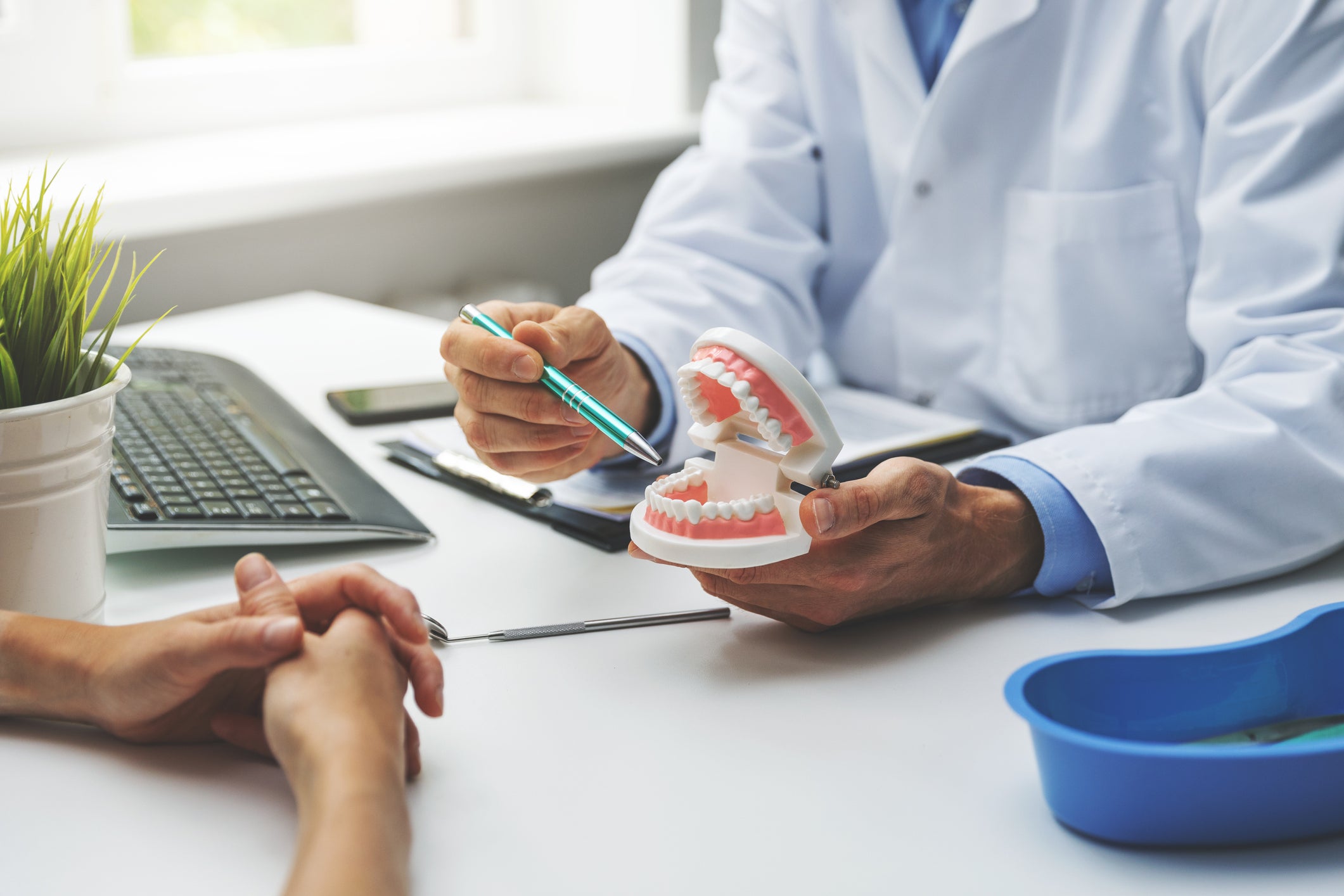
Dentists advise most patients to schedule an oral exam and cleaning twice a year. Each visit is your chance to learn more about your oral health and the treatments available to keep your smile healthy. Write down anything you want to ask during your next dentist visit. You may choose to ask some of the questions we’ve compiled here.
- Why do my teeth hurt? If you are experiencing toothaches or sensitivity, tell your dentist right away. Potential causes include tooth decay, cracked teeth, exposed roots, whitening products, orthodontic work, and fillings. Such problems aren’t always apparent during an exam, and your dentist can only recommend treatment if you speak up.
- Is whitening treatment right for me? Tooth whitening treats surface stains caused by coffee, tea, and other dark-colored foods and drinks. It does not address intrinsic discoloration, however. Your dentist can help you determine if whitening or another procedure, such as bonding or veneers, is most appropriate.
- How can I strengthen my teeth? If you’re worried about weak enamel or cavities, your dentist may recommend fluoride treatment. You can also improve the strength, appearance, and functionality of your smile with cosmetic bridges, fillings, or implants.
- What toothbrush, toothpaste, and floss should I use? With so many dental products out there, it never hurts to ask your dentist which ones they recommend. If you have weak enamel, sensitive teeth, gum recession, or other oral health concerns, you can receive advice specific to your situation.
- Should I use mouthwash? Brushing and flossing get plenty of attention, but your dentist may also recommend a therapeutic or prescription mouthwash to treat gingivitis, tooth sensitivity, inflammation, excessive gum bleeding, chronic staining, or other oral health concerns.
- Do you recommend wearing a mouthguard? Many people grind their teeth at night without knowing it. An observant dentist should recognize the signs of tooth grinding, also known as bruxism, even if you don’t ask about it. These signs may include receding gums, damaged enamel, popping jaw, and complaints of morning headaches. Your dentist can fit you with a custom mouthguard to ease your symptoms and protect your oral health.
- Could I be at risk for oral cancer? Tobacco use, heavy drinking, excessive sun exposure to the lips, and a weak immune system all increase your oral cancer risk. Early detection is critical for successful treatment, so request screenings often, even if you don’t think you have cancer.
- Why do I need dental X-rays? Most dentists recommend bitewing X-rays once a year and a full-mouth series every four to five years. X-rays reveal what’s happening beneath the surface, which is vital for diagnosing problems and pursuing the proper treatment.
Looking for personalized answers to these and other oral health questions? Please contact Park 56 Dental at (212) 826-2322 and schedule an appointment at our NYC dentist office today! Our knowledgeable team can address all of your concerns and help you make the best choices for your oral health.
-
New Year’s Resolutions for Better Oral Health
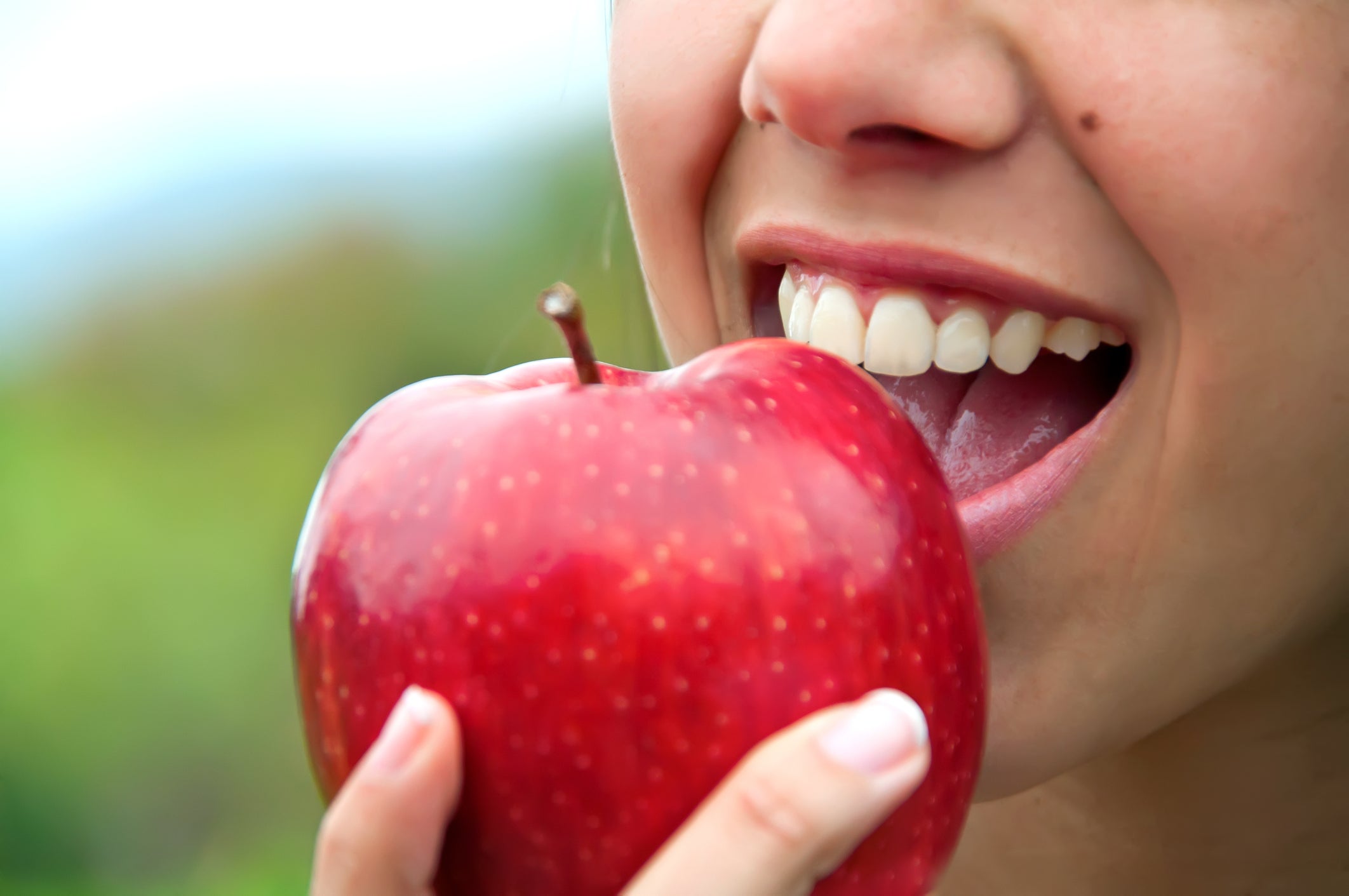
Welcome to the new year! Have you set any resolutions yet? Consider adding oral health to the list of things you want to improve in 2021. Here are the strategies that will help you achieve a brighter, healthier smile in the coming year.
Load Up on Fruits and Vegetables
Eating well is important for healthy teeth and gums. The vitamins, minerals, and antioxidants found in fruits and vegetables can help protect you against gum disease. Crisp, crunchy options such as apples, carrots, and celery also scrub your teeth to help fight plaque. Besides produce, other mouth-friendly foods include dairy, nuts, legumes, and tea.
Eat Less Sugar
While you’re loading your plate with fruits and vegetables, remember to lessen your sugar intake as well. This simple resolution can improve your health in many ways, including dramatically reducing the risk of tooth decay. The change can be simple—reach for sugar-free seltzer water instead of soda, and chew sugar-free gum instead of munching on candy.
Quit Smoking
Smoking is incredibly harmful to your oral health, increasing the risk of cavities, tooth discoloration, gum recession, gum disease, and oral cancer. Smokers are also twice as likely as non-smokers to experience tooth loss. It isn’t just smoking—tobacco use of any kind can be detrimental.
Brush Twice a Day
It’s easy to skip brushing, promising yourself that you’ll brush “extra well” the next day. However, going to bed with unbrushed teeth invites bacteria to eat away at your enamel and cause cavities to develop. It’s equally important to brush your teeth in the morning—not just to freshen your breath, but to eliminate acid and bacteria that build up overnight. Otherwise, a hard, tooth-staining substance called tartar is likely to form.
Commit to Flossing
Arguably more important than brushing, flossing removes plaque and debris from between your teeth and along the gum line that your toothbrush leaves behind. It also stimulates the gums to help prevent recession and gingivitis. If flossing once a day isn’t already a habit, implement it into your new oral health routine.
Visit the Dentist at Least Twice a Year
While all of these at-home tips help keep your smile bright between dentist visits, they can’t replace professional cleanings and dental exams. After all, only a dentist can remove plaque, scrape away tartar, and treat developing problems early before they threaten your long-term oral health.
Whiten Your Teeth
There’s no better time than the new year to brighten your smile! In-office Zoom! whitening lightens your teeth by an average of eight shades in a single, one-hour visit. The treatment is a safe, simple, and relaxing way to help you look and feel your best in 2021.
Park 56 Dental is proud to offer preventative, restorative, and cosmetic dentistry to improve the health and appearance of your smile. Visit our spa-like, patient-centered dentist office to receive the personalized, quality care you deserve. Contact us online or call (212) 826-2322 today to learn why we’ve been voted Top Dentist in NYC!
-
A Step-by-Step Guide for Proper Flossing
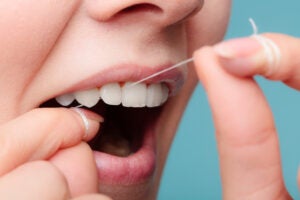
The benefits of flossing include superior plaque removal, healthier gums, and a lower chance of cavities. Perhaps you intend to add this good habit to your oral care routine, but you’re not sure how to floss. Follow this step-by-step guide for the best results.
How to Floss Your Teeth
- Break off 18 inches of floss from the spool and wrap the ends around your middle fingers.
- Grasp the floss with your thumb and forefinger to secure it better and prevent squeezing your middle fingers.
- Guide the floss between two teeth at a time, being careful not to snap it against your gums, as this could cause trauma to the soft tissue.
- Glide the floss up and down, arching it into a c-shape so it rubs against one tooth and then the other. Extend the floss down below the gum line to remove plaque buildup here as well.
- Gently remove the floss from between your teeth.
- Repeat this process throughout your entire mouth. Be sure to floss behind your back molars as well.
- Every few teeth, wipe the collected debris onto a facial tissue and shift to a clean section of floss.
- Dispose of the used piece of floss in a trash can, not the toilet.
If your gums bleed when you floss, this could be a sign of gum disease. Flossing strengthens your gums, so keep up the habit, and the bleeding should subside after about two weeks.
Flossing with Braces
Because food and plaque are more likely to become trapped under bands and wires, flossing when you have braces is very important. Special stiff floss makes it easier to thread under your braces so you can pass it between your teeth. You may also opt for a flossing alternative to complete the task more quickly.
Alternatives to Traditional Floss
If you dread flossing because you have braces, or you simply don’t feel coordinated enough to do it properly, try an alternative to traditional dental floss. Here are your options:
- Dental floss picks are the closest equivalent to regular floss. They consist of a bit of floss stretched between a u-shaped piece of plastic. A small handle lets you comfortably hold the floss pick without having to wrap floss around your fingers.
- Interdental picks feature short rubber tines attached to a small handle. The increased size of the flossing material makes it easier to clean more thoroughly between larger gaps or areas with receding gums.
- A water flosser is a mechanical device that sprays a fine jet of water between your teeth to remove food particles and plaque quickly and easily. It’s a great choice for people who hate the feeling of floss scraping against their teeth.
Talk to your dentist about which flossing product may be best for you.
Ready to discuss your oral care routine? Have a concern about flossing every day? Please contact Park 56 Dental at (212) 826-2322 for advice from a leading NYC dentist.
-
Everything You Need to Know about Mouthguards
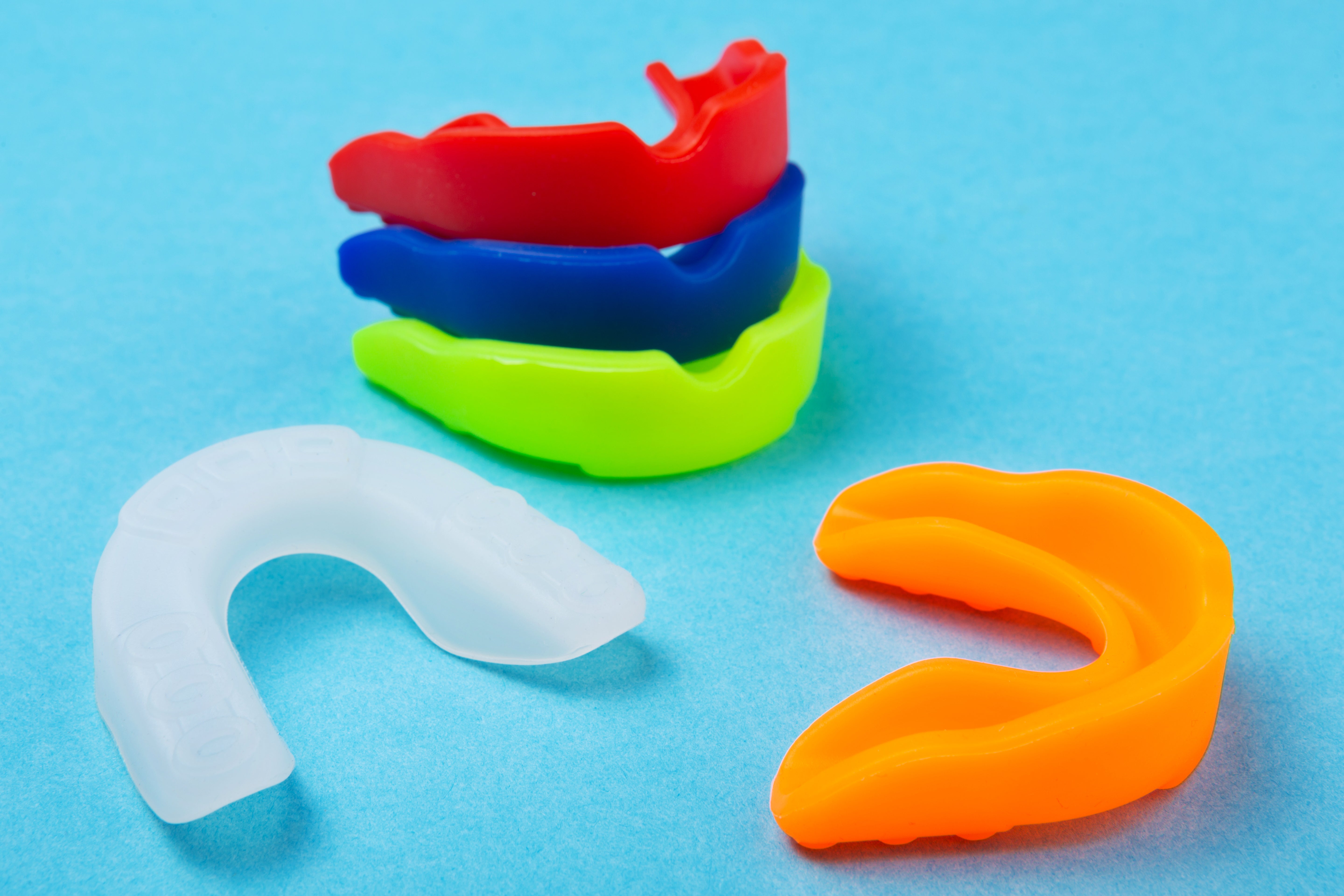
Playing sports can be risky. You could twist your ankle, sprain a wrist, bite your lip, or get a tooth knocked out. While you can’t eliminate all risks when playing sports, you can protect your teeth and lips by wearing a custom mouthguard. Learn more about your options here to help you decide what’s best for you.
What is a Mouthguard?
A mouthguard is an oral appliance designed to protect your teeth, lips, and cheeks from injury while playing sports. Similarly, night guards help prevent damage from nighttime tooth-grinding, also known as bruxism. The American Dental Association (ADA) has specific guidelines for what makes the ideal mouthguard. The appliance should:
- Sit comfortably and securely in the wearer’s mouth
- Cover all the teeth on one or both arches
- Have a resilient design and construction with materials approved by the Food and Drug Administration (FDA)
- Be easy to clean
- Maintain high-impact energy absorption and force transmittance if the wearer is playing sports
Types of Mouthguards
Not all mouthguards are created equal. There are three main types to choose from:
- Stock mouthguards come in various sizes, with most options fitting over the top teeth. This option can be bulky and uncomfortable.
- Boil-and-bite mouthguards are inexpensive options available in most drugstores. You place the mouthguard in boiling water to soften it, and then mold it to your teeth for a better fit than most stock mouthguards can provide.
- Custom-made mouthguards are the best, longest-lasting options available. A dentist makes a mouthpiece just for you, with the perfect fit and maximum comfort.
Do I Need a Mouthguard?
Mouthguards serve different purposes. You should consider getting one if any of the following applies to you:
- You play sports. The ADA recommends mouthguards to protect against chipped teeth, knocked-out teeth, and soft tissue injuries while playing full-contact sports such as hockey, football, lacrosse, and wrestling. Athletes who play non-contact sports can also benefit from wearing a mouthguard.
- You grind your teeth at night. You’ll need to wear a different kind of mouthguard, known as a night guard, to prevent tooth grinding while you sleep.
- You have jaw joint disorder. Temporomandibular Joint Disorder (TMJD) is a condition that causes the muscles around your jaw to become inflamed, leading to tooth clenching and grinding. A specially made mouthguard can help with this.
At Park 56 Dental, we help our patients protect their teeth with Under Armour® Performance Mouthwear™. These advanced mouthguards are custom-made to fit your bite for superior protection and comfort. Under Armour mouthpieces are made from the highest quality materials for safety and durability. Athletes who play sports in college, professional leagues, and the Olympics put their trust in Under Armour, and so can you.
If you’re an athlete looking for the best teeth and mouth protection available, please call Park 56 Dental at (212) 826-2322 or schedule an appointment online today. We offer quick, custom mouthguard fittings that take as little as 20 minutes.
-
What is an All-on-4 Implant Procedure?
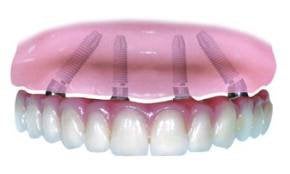
Just a decade ago, most patients were unaware that an All-on-4 implant procedure even existed. Today, many people specifically request this alternative to dentures and traditional full-arch implants. What exactly is this restoration technique, and could it be right for you?
About All-on-4 Implants
All-on-4 implants are a full-arch fixed dental implant bridge. This technology immediately replaces an entire row of teeth. As the name suggests, all the teeth are supported on just four posts that are surgically implanted into your jawbone. The result is a mouthful of healthy-looking, naturally functioning teeth.
Benefits of All-on-4 Implants
If you’re considering dental implants for a full arch of teeth, All-on-4 implants might be the better choice. The procedure is faster, more cost-effective, and requires no bone grafting for most patients. Plus, only four posts are needed compared to six or eight posts. In this way, All-on-4 implants save you time, money, and discomfort compared to traditional full-arch implants.
Then, unlike dentures, All-on-4 implants:
- Are permanent additions to your mouth that can be brushed like natural teeth
- Never have to be taken out
- Require no adhesives
- Support a strong bite force so you can eat all your favorite foods again
- Are comfortable because they are in a fixed position rather than pressing on your gums when you bite and chew
- Allow for the full taste and temperature experience of your food
- Prevent jawbone deterioration
- Help you maintain a healthy facial structure
The All-on-4 Implants Procedure
This technology uses “tilted implants” to increase strength and stability, as well as avoid damage to the sinus cavity in the upper jaw and the nerve canal in the lower jaw. The initial surgery involves installing the implants. A temporary set of teeth is placed over the implants before you leave the office. Once the healing process is complete about six months after surgery, a permanent, custom bridge is placed.
Candidates for All-on-4 Implants
You may be a good candidate for this procedure if you are missing most or all of your teeth on one or both arches. It doesn’t matter whether you already wear dentures or not. Age is also not a limiting factor—as long as you’re in good overall health, you may qualify.
Be prepared to take excellent care of your All-on-4 implants, using many of the same techniques you would expect with natural teeth. Proper care is needed to help your implants last for many years to come. Rest assured that your dental hygienist will review all instructions with you and recommend the best daily oral care plan to fit your needs.
The skilled dentists at Park 56 Dental work with the nation’s top laboratories for access to 3D, digitally guided plans. This ensures expert post placement and flawless prosthetic teeth for a smile you can be proud of! If you’re interested in learning more about the All-on-4 implant procedure, please contact us online or call our New York City dentist office at (212) 826-2322.
-
The Importance of Dental Cleaning
Good oral health is important for everyone. After all, healthy teeth and gums help you smile with confidence. That’s why you’re diligent about brushing and flossing every day. Considering how well you take care of your mouth at home, you may wonder if professional dental cleanings are worth the time and effort.
The American Dental Association recommends having your teeth cleaned twice a year. Despite this advice, almost a third of Americans fail to visit the dentist even once a year. If you haven’t had a professional cleaning in a while, brush up on why it’s so important to visit the dentist regularly.
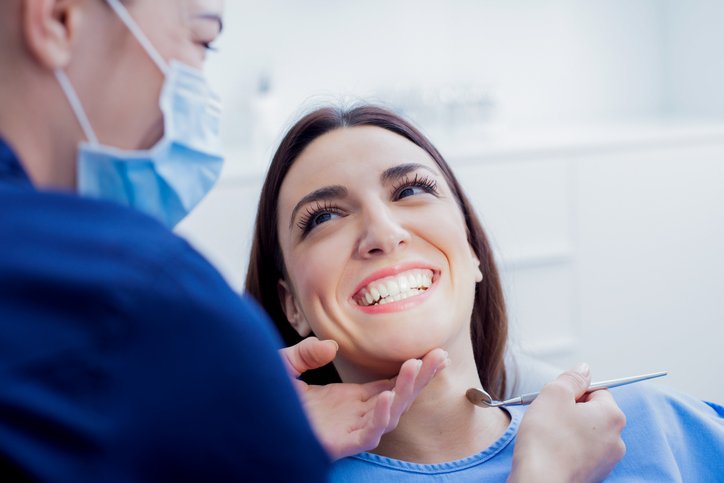
Detect Dental Problems Early
In addition to cleaning your teeth, the dentist can also screen you for other problems such as oral cancer, cavities, broken fillings, and gum disease. Early detection means you can start treatment right away, potentially avoiding a root canal, gum surgery, or tooth extractions. This not only saves you the hassle of having these procedures done—it also helps you avoid the costs that go with them.
Protect Your Teeth and Gums
Nearly 75 percent of Americans have some form of gum disease, also known as periodontal disease, many of whom don’t even know it. The earliest stage of the disease, called gingivitis, doesn’t cause pain or other obvious symptoms, so it can go undiagnosed if you never visit the dentist. Left untreated, gum disease can cause tooth loss. Luckily, with an early diagnosis, you can treat or even reverse the condition.
Prevent Bad Breath
Underlying dental problems are to blame for most cases of chronic bad breath, also known as halitosis. With regular cleanings to keep your teeth healthy and free of tartar buildup, you can prevent bad breath from getting in the way of your social life.
Protect Your Health
Did you know that taking good care of your teeth can improve your overall wellbeing? Numerous studies have shown a link between gum disease and your heart, lungs, kidneys, and more. Here are some interesting facts from the American Dental Hygienists’ Association to keep in mind:
- If you have gum disease, you are more likely to develop cardiovascular problems, including heart disease and stroke.
- 95 percent of Americans with diabetes also have periodontal disease.
- Harmful bacteria in the mouth caused by gum disease can aggravate respiratory conditions.
- Early signs of kidney disease, osteoporosis, eating disorders, HIV/AIDS, and other conditions often appear in the mouth and can be detected during a dental cleaning.
- Oral cancer is curable in its early stage, but it must be diagnosed at a dentist’s office before treatment can begin.
Park 56 Dental is pleased to help our customers smile confidently with routine dental cleanings. Visit our spa-like, patient-centered New York dentist office for personalized, quality care. You’ll feel so pampered that you won’t believe you used to postpone trips to the dentist! Contact us online or call (212) 826-2322 to schedule your initial visit with us today.
RECENT POSTS
categories
- Uncategorized
- Cosmetic Dentistry
- Veneers
- Healthier Teeth
- Teeth Whitening
- Dental Health
- Video
- Dental Emergencies
- Invisalign
- Dental Implants
- Root Canal
- Sedation Dentistry
- Infographic
- Dental Crowns and Bridges
- Dental Anxiety
- Gum Disease
- COVID-19
- Bad Breath
- New York Dentist
- Cut out sugar
- General Dentistry
- Oral Health
- Oral Cancer
- Dry Mouth
- Gum Health
- Toothache
- Dental Sealants
- Cavities
